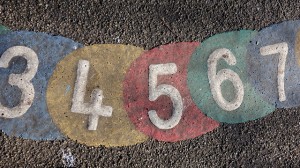Rules For Writing Numbers
One of the big issues that many people have when it comes to writing is how to write numbers. Should you write “12 days” or “twelve days”? Is it “4 puppies” or “four puppies”?
Perhaps the biggest question is whether there are specific rules for writing numbers that you need to follow, or does it always depend upon the situation?
In this case, one of the reasons for all the confusion about the grammar rules for numbers is that there isn’t one specific answer to that question. Whether you should use the actual digits to represent a number, or spell out the word, depends upon the situation.
Here are some easy rules for writing numbers that will help this cloudy situation become a little clearer for you.
Rules for Writing Numbers

Before we begin, it’s important to note that for the purposes of this article, when we say “digit”, we’re talking about 1, 3, 14, 27, etc. When we talk about “spelling it out”, we mean “one”, “three”, “fourteen”, “twenty-seven”, etc.
- One rule that you can always count on is that you should spell out the smaller numbers. If you’re using a number (without decimals) that is smaller than 10, it should be spelled out.
- Another basic rule for writing numbers is you should never start a sentence with a digit, regardless of the size of the number. For example, you should never say “2,000 tickets were sold for the event.” Instead, it should say “Two thousand tickets were sold for the event.” However, in many instances (especially if you’re using larger numbers), it’s best to simply reword your sentence so it doesn’t start with a number at all. “The event sold 2,000 tickets.”
- If you are using estimated numbers, they should be spelled out. Instead of saying “about 100,000”, you should say “about one hundred thousand”.
- When there are two or more numbers next to each other, one of them should be spelled out, simply for clarity. If you write two numbers next to each other, it gets very confusing, regardless of whether they are both digits or both spelled out. Instead of writing “7 3” note cards”, you should say “seven 3” note cards”.
- Consistency also plays a role in determine whether to use write the digits or spell out a number. If you have two or more numbers in the same sentence, use the same option for all of the numbers.
- Another of the rules for writing numbers is that you should always use the digits when writing out a recipe.
- Ordinal numbers should always be spelled out. When you’re talking about your first love, it should be “first love”, not “1st love”.
Those are the rules for writing out numbers that most experts agree upon, however after that, it gets a little tricky. If your situation doesn’t fit any of those scenarios, there are no set rules to follow. The most popular opinion is that you should spell out one-word numbers, but if it’s a two-word (hyphenated) number, it should be shown as the digits.
That means you should use twenty, eleven, 28, etc when writing numbers, if none the above rules apply.
It can definitely be a challenge to remember all of the rules for writing numbers, but if you bookmark this post, and refer to it when you’re writing, you will leave a much more positive impression on whoever is reading what you wrote!
